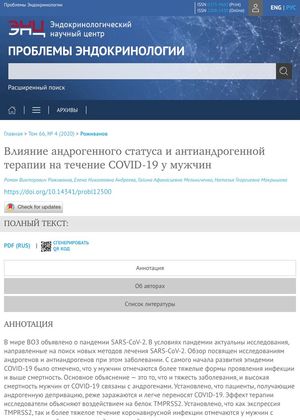TLDR Male hormones may make COVID-19 worse, while substances that block these hormones could lessen symptoms.
The document "Androgens and Antiandrogens influence on COVID-19 disease in men" discusses the role of androgens (male hormones) and antiandrogens (substances that block these hormones) in the severity of COVID-19 in men. The paper suggests that high levels of androgens may increase the severity of COVID-19 symptoms, while antiandrogens could potentially reduce these symptoms. This is based on the observation that men with androgenetic alopecia, a condition characterized by high androgen levels, are more likely to experience severe COVID-19. Conversely, men undergoing antiandrogen therapy for conditions like prostate cancer seem to have milder COVID-19 symptoms. However, the paper emphasizes that more research is needed to confirm these findings and understand the underlying mechanisms.
 119 citations
,
May 2020 in “Journal of The American Academy of Dermatology”
119 citations
,
May 2020 in “Journal of The American Academy of Dermatology” Most COVID-19 patients in hospitals have androgenetic alopecia, more in men, suggesting a link between androgen sensitivity and severe COVID-19 symptoms.
 123 citations
,
May 2020 in “Drug Development Research”
123 citations
,
May 2020 in “Drug Development Research” Men's sensitivity to male hormones might affect how severe COVID-19 gets for them.
 71 citations
,
April 2020 in “Journal of Cosmetic Dermatology”
71 citations
,
April 2020 in “Journal of Cosmetic Dermatology” Genetic differences may affect COVID-19 deaths; anti-androgens could be potential treatment.
 113 citations
,
July 2020 in “Communications biology”
113 citations
,
July 2020 in “Communications biology” Men, especially older ones with health issues like prostate cancer, may have worse COVID-19 outcomes and could benefit from therapies targeting male hormones.
 8 citations
,
July 2012 in “Cambridge University Press eBooks”
8 citations
,
July 2012 in “Cambridge University Press eBooks” Androgens can both increase body hair and cause scalp hair loss.
 7 citations
,
December 2020 in “Clinics in Dermatology”
7 citations
,
December 2020 in “Clinics in Dermatology” Some alopecia treatments might help treat COVID-19, but more research is needed.
 October 2020 in “Проблемы эндокринологии”
October 2020 in “Проблемы эндокринологии” Men with higher androgen levels may have severe COVID-19 symptoms, but those on antiandrogen therapy are less likely to contract the virus and have milder symptoms. Anti-androgen drugs could potentially treat COVID-19, but more research is needed.
 1 citations
,
January 2022 in “European Journal of Pharmacology”
1 citations
,
January 2022 in “European Journal of Pharmacology” Riboflavin 5′-phosphate (FMN) shows potential for treating androgen-related conditions but may be limited in treating prostate cancer.








